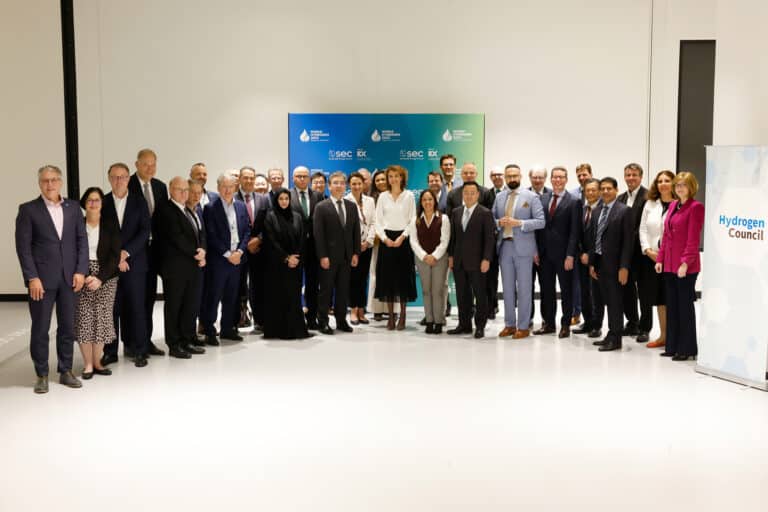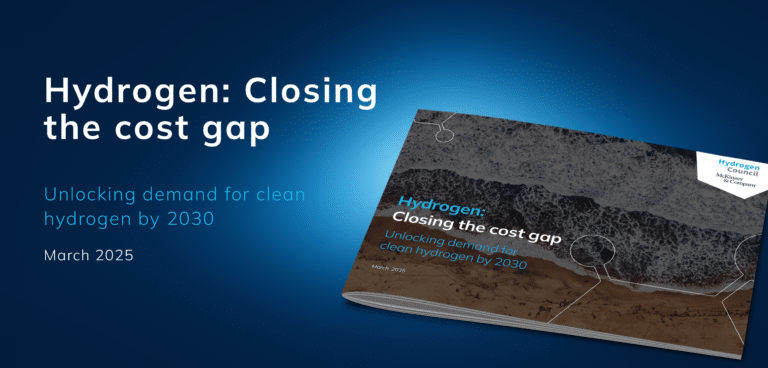Hyundai was one of 13 founding members of the Hydrogen Council when the global CEO-led initiative was created in 2017. Why did Hyundai want to be a part of the Hydrogen Council?
The automotive industry is one of the major contributors of global greenhouse gas emissions. This is why Hyundai Motor Group, whose mission is to make sustainable progress for humankind, is taking responsibility for addressing environmental issues and has invested significantly in hydrogen research and development for a considerable amount of time.
However, the process of putting hydrogen fuel cell cars on the road has not been easy. We realized that Hyundai Motor Group cannot fulfill its responsibility to future generations by simply developing hydrogen fuel cell electric vehicles without global consensus and cooperation.
Therefore, we elected to be part of the Hydrogen Council with the hope that more people will join us to explore hydrogen’s possibilities and realize its practical uses for the benefit of the environment and society.
Hyundai became Co-Chair of the Hydrogen Council in 2018. Perhaps you have a memory from the early days of the Council to share with us?
At that time, it was before there was global consensus on forming a hydrogen society. There weren’t many cases for hydrogen use, except for cars and some power generation fields. Nonetheless, it seemed that each company that joined the Council had a clear vision for the future possibilities and practical applications of hydrogen energy.
Also, I remember that the first report released by the Hydrogen Council at the time was very comprehensive. The report still remains to this day a good reference for the public to understand the hydrogen society six years later.
It’s been six years since the Hydrogen Council launched and the organization now has 145 members. What’s it like to see such significant growth within the Council? And more widely, recognition for hydrogen increase?
It is good to see more companies joining the Council for global hydrogen cooperation. In particular, I would like to call greater attention to the expansion in its depth of membership, given that the Council, which was initially composed of energy and automotive companies, now has members from diverse industries such as steel, aerospace, finance and IT. This proves that the transition to a hydrogen society is not limited to individual companies or sectors and is everyones responsibility.
With the growth of the Hydrogen Council, I believe that awareness of hydrogen energy has also improved significantly. Compared to the past, when we waited to see who would make a bold decision first, it is very encouraging that a competitive landscape is being created at government, industry and corporate levels to lead the upcoming hydrogen economy.
However, I think we still have much work to do before the public becomes more familiar with hydrogen energy and understands that it is safe to use.
Can you tell us about any exciting hydrogen plans Hyundai has planned for 2023?
To achieve Hyundai and Kia’s 2045 carbon-neutrality goals, we must make the transition to a hydrogen society. Especially, Hyundai is one of a few automakers that have succeeded in mass-producing both hydrogen fuel cell and battery electric vehicles. It is continuing development to expand the supply of hydrogen-powered vehicles — the first step in the transition to a hydrogen society.
In 2023, Hyundai Motor Group intends to embark on a full-scale journey to transition to a hydrogen society. To establish a sustainable supply chain, we will take the lead in preparing for the application of green steel and eco-friendly parts, and gradually convert utilities and raw materials used at our business sites around the world to renewable energy, waste resources and ultimately hydrogen. In the mid- to long-term, we will make continuous efforts to achieve carbon neutrality throughout the automotive value chain by securing a large amount of hydrogen and converting the product logistics system outside business sites to hydrogen.
As I emphasized when serving as co-chair of the Hydrogen Council, cooperation and support between governments and industries as well as global companies and countries is essential to accelerate the transition to a hydrogen society. These efforts are not short-lived but must continue unwaveringly for future generations. Hyundai Motor Group will cooperate with like-minded partners in various ways to carry out these efforts and achieve our aim.
As momentum for hydrogen continues to increase, where do you think the Hydrogen Council needs to focus its efforts in 2023?
There are discussions taking place on specific topics, such as the demand for hydrogen and other details such as the hydrogen production technologies and related supply chain as well as infrastructure needs. If the last five years have been a period for publicizing the possibility of hydrogen and preparing policy and institutional systems, then now is the time to act. I think it is an especially important time for cooperation and solidarity between governments and related industries.
However, the current global environment does not seem to be very favorable to expand such cooperation. Now, when we are facing slowing economic growth, growing geopolitical complications and intensifying protectionism, I believe it is most urgent to suggest a direction for global hydrogen cooperation so that we do not lose any momentum toward establishing a hydrogen society.
An even bigger responsibility is being placed on the Hydrogen Council ahead of the full transition to a full-fledged hydrogen society. Hyundai Motor Group will support the Hydrogen Council by doing its best to advance hydrogen society through closer cooperation with all related stakeholders.
About The Hydrogen Council
The Hydrogen Council is a global CEO-led initiative that brings together leading companies with a united vision and long-term ambition for hydrogen to foster the clean energy transition. The Council believes that hydrogen has a key role to play in reaching our global decarbonization goals by helping to diversify energy sources worldwide, foster business and technological innovation as drivers for long-term economic growth, and decarbonize hard-to-abate sectors.
Using its global reach to promote collaboration between governments, industry and investors, the Council provides guidance on accelerating the deployment of hydrogen solutions around the world. It also acts as a business marketplace, bringing together a diverse group of 140+ companies based in 20+ countries across the entire hydrogen value chain, including large multinationals, innovative SMEs, and investors.
The Hydrogen Council also serves as a resource for safety standards and an interlocutor for the investment community, while identifying opportunities for regulatory advocacy in key geographies.
To find out more visit www.hydrogencouncil.com and follow us on Twitter @HydrogenCouncil and LinkedIn.
Joanna Sampson, Communications Manager, Hydrogen Council
joanna.sampson@hydrogencouncouncil.com



